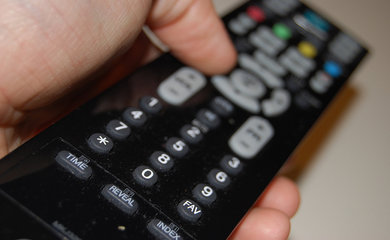The CW’s The 100 has become bizarrely compelling for me in a way I totally didn’t expect. Every time a new science fiction show crops up on the horizon, I quiver with excitement, hoping that it will be the one, and then my joy fizzles out, leaving behind only the cracked remnants of my dreams. I’m fervently hoping that doesn’t happen in this case, and I think I might be case, for one simple reason: My expectations of The CW are not very high. (This is, after all, the network that runs Reign, one of my unabashed total cheeseball pleasures.)
The premise of The 100 is that nearly 100 years after nuclear war destroyed the surface of the planet, the humans who survived by virtue of living in the space stations in orbit around the planet have gathered together to create a massive community, known as the Ark. The residents of the Ark are waiting out the generations until it’s safe to return to Earth again, but tensions are rising on the structure, which is built from the remains of space stations, cobbled together.
The Ark is running out of resources, and the authorities on board are considering a purge of residents, killing hundreds to ensure that the rest of the community can survive. Life on the Ark is already harsh: The penalty for crimes is death, for example, and people live on limited rations and decreased oxygen. Purging would underscore the desperation of the community, so first, the authorities try an experiment. They drop 100 teenage delinquents (teen criminals are kept in lockup until 18, at which point they’re executed) onto the surface of the planet to see what happens.
In the Lord of the Flies landscape on the surface of the Earth, the teens need to figure out how to support themselves and how to structure their society in a world that is still struggling with the aftermath of nuclear war. They’re cut off from the Ark due to a series of communications systems failures, leaving the administration with no idea about their fate, and they discover that they’re not alone; despite the belief that the war wiped out all remains of life on Earth, other things are out there, and some of them are intelligent.
The first thing you have to understand about The 100 is that it is absolute trash television. This is an important facet of your personal enjoyment level, as if you don’t, you’ll find yourself continually frustrated by the absurd implausibilities of the show. For example, how are teens who have lived in space their entire lives able to move, run, and be highly athletic on the ground with such ease? Suspension of disbelief factor on this show is high, probably a 10/10, and you need to view it less as hard science fiction and more as a character study in a dystopian setting.
Make no mistake: The 100 traffics on the young adult dystopian trend, and it’s running on the CW, a network that caters to the teen crowd. This is not about deep, complex social commentary and an epic, sweeping narrative, or good production values and subtle acting. This is pure, corn syrup-infused junk television, and that’s not to everyone’s tastes. The bitter taste of teen romance, the battles between different factions, and the petty fussing of the kids on the ground can be at times frustrating, even as you’re also reminded of Piggy and the conch.
Meanwhile, in space, the adults are acting in a way that closely mirrors the teens on the ground, for all their supposed superiority of years of experience. They’re engaged in their own internal dramas while trying to run a refuge that is falling apart, and suspension of disbelief is equally high here. (Why purge when you could send volunteer adults to the surface, for example, since presumably someone has planned for the inevitable day when humanity will be brought back down to the surface? Surely letting people try their luck on Earth is better than simply killing them.)
You may recognise some of the faces in space, including Henry Ian Cusik (Lost) as Kane, and Isiah Washington (Grey’s Anatomy) as Chancellor Thelonius Jaha. While they’re stuck in a teen drama, they seem to be making the best of their fate, and they try to bring a little nuance and interest to their roles, even when they’re trapped in dull dialogue and formulaic plots. To the CW’s credit, the network also tried to create some diversity both on the ground and in space, reflecting the fact that astronauts themselves are diverse (though curiously, almost no Chinese or Japanese astronauts appear to have survived the initial calamity — perhaps they were on the ground for a nice holiday dinner or something). It’s a nice change from science fiction that’s unilaterally white, and it shows that the CW, at least, may be listening to growing calls from fans for more diversity and better representations on television.
The show has wrapped up its first season and has already been renewed for a second, which starts this October, demonstrating that the network has some faith in this effort. Hopefully viewers will too, as long as they don’t expect too much. This is never going to be high drama or amazing television, but it is awfully fun.

